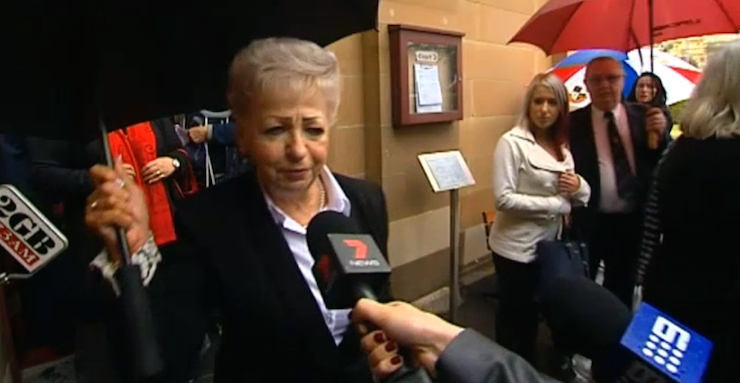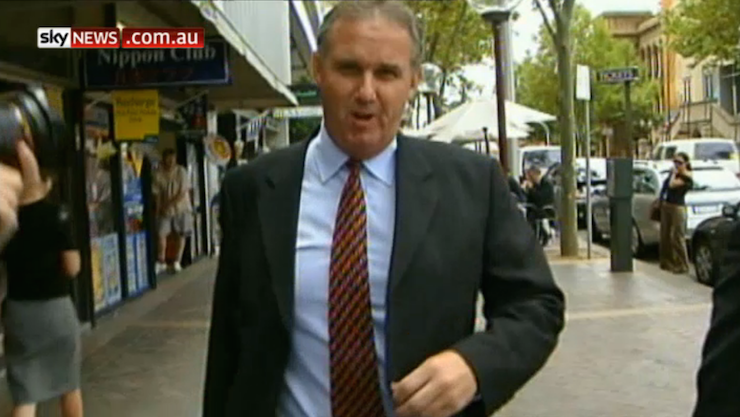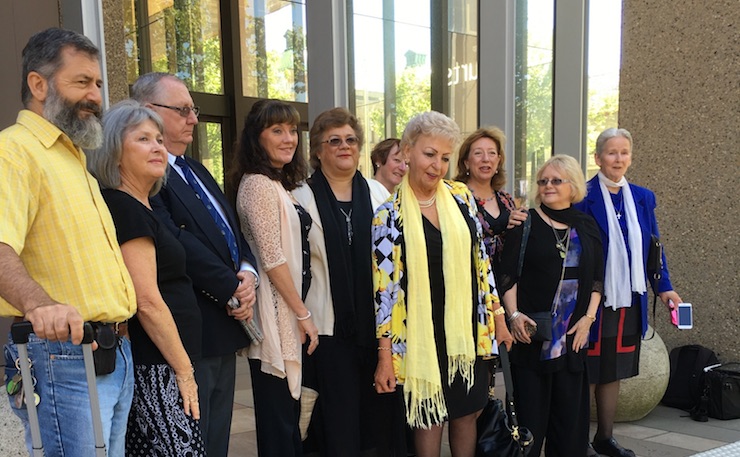In 1989 a 42-year old woman had her life changed by a miscarriage of justices. Even now, the state of NSW refuses to allow her fight to come to an end. Wendy Bacon reports.
For 26 years, the state of NSW has pursued Roseanne Beckett.
Last week, NSW Supreme Court Justice Ian Harrison ordered the state to pay Beckett $4,091,717 in damages for maliciously prosecuting her on charges of perjury and soliciting a man to murder her then husband Barry Catt. He also ordered the Crown to pay her costs, likely to be at least $4 million dollars.
For the convictions that resulted from these charges – now overturned – Beckett served six years in prison.
This malicious prosecution case has already gone for seven and half years. Beckett and her many supporters were hoping that the NSW government might finally let it rest. But it is already clear that the state has not ceased its campaign.
Justice Harrison noted the speed with which senior counsel for the Crown John Maconachie announced its intention to appeal, even before his judgment “had been delivered into its hands, let alone read”, reinforcing his perception that the state has only ever been interested in a “capitulation” by Beckett.
The Crown had only until November 24 to apply for a stay or halt on Justice Harrison’s orders pending an appeal. Yesterday afternoon, Beckett received news from her lawyers Turner Freeman that the Crown will apply for such orders next Monday morning, just one day short of the deadline. The application will be opposed.
The big unresolved issue now hanging over this historic miscarriage of justice case is not whether Beckett was guilty of the nine charges initiated by then Newcastle Detective Peter Thomas, who led a team of other police on a raid on her home way back in August 1989. Instead the big questions are: why has the Crown so determinedly defended the improper conduct of Thomas? And why has the NSW government so comprehensively failed to hold those who acted on its behalf accountable?
Thomas, who avoided disciplinary charges related to intimidating witnesses in his campaign to send Beckett to prison, resigned from the NSW police force before her trial in 1991. But he remained actively involved in pursuing Beckett and any who he saw as supporting her cause until his death shortly before the malicious prosecution hearing ended last year. Reporters were not immune. He attempted to blacken my own name by spreading allegations to News Corporation, ABC’s Media Watch, Fairfax Media and the Media Alliance that I was biased against him because he arrested me in my youth. These allegations were false.
Malicious prosecution cases are notoriously hard to prove because the plaintiff must show not only that the prosecutor had malicious intent but also that there was an absence of any reasonable cause to prosecute. Harrison found Thomas “intensely disliked” Beckett, who had previously laid a complaint against him. He found that Thomas was a frightening and “corrupt bully” who used “intimidating antics” to pressure witnesses in the Beckett case. He found that the plaintiff had established the essential ingredient of malicious intent on all counts.
Beckett only succeeded in proving an absence of reasonable cause to charge her in two of six counts. Nevertheless, this still meant a verdict was entered in her favour. Although she did not prove absence of reasonable cause on the other four counts, she was acquitted of two other charges and another three were dismissed by the Court of Criminal Appeal in 2005. She remains convicted of two charges. She served terms of imprisonment on eight charges though Justice Harrison was of the view that most of these charges would not have ordinarily have led to a prison sentences and that the case would have been entirely different if Thomas had not been involved.
While she was in prison Beckett was badly assaulted, a contract was taken out on her life, and her health suffered. The damages are intended as some compensation for these long years of wrongful imprisonment and suffering, her loss of family and friends, her right to work, and damage to her reputation which began when Thomas arranged for her to be taken handcuffed from her home in Taree and paraded in front of the local media.
As Justice Harrison commented, there is no way of knowing what Beckett’s life might have been. In 1989, she was a 42-year old woman with no criminal record who he observed was definitely of “good character” and had considerable “energy and independence”. Her fight for justice has required every ounce of that energy and independence.

Last week’s decision was the second stage in Justice Harrison’s judgement. Twenty-six years from the day of her arrest in August 24, Justice Harrison handed down his decision and awarded Beckett $2.3m in damages. It’s normal to pay interest on damages and the judge asked lawyers for Beckett and the Crown barristers to agree on interests and costs before he finalised his judgement. Only if they failed to do so would he need to preside over a further hearing.
On that day Beckett and her supporters celebrated her victory at a press conference which most of the media also assumed was the finale. But this was not the first time that Beckett has made a victory speech.
After nearly a decade in prison Beckett was released in 2001 when a fresh appeal was ordered after new evidence emerged in her case. In 2004, at the end of a four-month inquiry, Justice Davidson found that it was likely that key prosecution witnesses had conspired to fabricate evidence against her. The Crown completely rejected his findings. Nevertheless, Beckett won her appeal. By now she had been acquitted of two charges and another five had been dismissed. At that stage, the NSW Labor government could have offered some compensation. It declined to do so.
She sued for malicious prosecution. The NSW state then spent a considerable amount of public money in an unsuccessful High Court bid to deprive her of the right to sue. No settlement was offered and the case continued with the Crown taking every technical point to keep evidence of Thomas’ misconduct in this and other matters out of the proceedings.
Last year, Beckett’s legal representatives offered to settle the case for $2 million. The Crown lawyers did not even reply. By that failure they added to the amount of public money at risk should they lose the case. Referring to the Crown’s failure to respond, Justice Harrison found that “the State’s total disregard for the offer of compromise does not inspire me with confidence that the State was anxiously hanging out for an opportunity to settle the proceedings. On the contrary, even allowing for the fact that my view of the settlement landscape was necessarily obstructed, I never once acquired the feeling that the State was even in the slightest fashion interested in settling the proceedings upon any basis other than a complete victory for it.”
The NSW Crown lawyers are supposed to act as ‘model litigants’. This means they should keep costs to a minimum and apologise where appropriate. They would appear to have fallen well short of model litigant conduct in this case.
The malicious prosecution trial took place last year. The Crown failed to call three key prosecution witnesses that Judge Davidson had found were likely to have fabricated evidence. This deprived Justice Harrison of the opportunity to see them give evidence and the plaintiff to chance to cross-examine them.
Beckett finally triumphed in August. Justice Harrison reminded the Crown that the case had already taken more than seven years. Would they finally accept the result? True to form, the lawyers representing the state did not blink.
Maconachie and his team of Crown lawyers proceeded to file submissions that normal legal principles should be varied so that Beckett would be deprived of both interest and costs. They described the damages as “staggering” and even “irrational”.
They turned once again on Beckett suggesting that she had “stigmatised” Thomas by falsely alleging that he had planted a gun on her. Although Beckett’s case that there was no reasonable basis for that charge was not accepted by Harrison, she was acquitted of the charge of possession of a gun by the Court of Criminal Appeal in 2005.
With no agreement between the parties the case resumed in late October. Acting for Beckett, Kylie Nomchong SC called on the Crown to withdraw the submissions and apologise to Beckett. But the Crown refused to do so arguing that the only possible reason why Harrison did not accept some aspects of Beckett’s evidence was that she had deliberately lied. Justice Harrison disagreed, pointing out that the Crown’s argument did not logically flow from his finding and that it could even be that he was wrong.
Without a hint of irony Maconachie argued that he should be given more time to consider arguments for a stay in judgement pending an appeal given that public money was at stake. Given the millions spent in pursuing her, the murmur his comment inspired from Beckett’s staunch supporters was hardly surprising.
According to information supplied in response to a freedom of information request from NSW Greens Legal spokesperson MP David Shoebridge, the Crown had already outlaid more than $2.8 million in fees and disbursements in the defending Beckett’s claim for damages up until April this year. This includes fees for senior counsel and two junior barristers during the malicious prosecution trial. It does not include the cost of months of time of a small team of in-house government solicitors or the court time. For every written submission and judgement and every minute of court hearing the public bill grows. Along with the damages and plaintiff’s costs this case will have cost more than $13 million. The public cost of the entire case against Beckett would be at least $30 million including costs of imprisonment, courts, police, and massive legal bills for the Crown and defence.
It is worth looking more closely at the findings in the two counts in which it was decided there was no reasonable basis for the charge.
At the time of her arrest, Beckett had charged her husband with assault. Instead of allowing the part-heard proceedings to continue, Thomas charged Beckett with perjury. On the day the assault case was due to continue, he improperly arranged for her bail to be withdrawn so that she was held in custody. Although the Supreme Court soon released her again, the assault proceedings were never finalised. Justice Harrison found that the “laying of the perjury charge was patently improper” and that Thomas could have formed “no honest or reasonable belief” that Beckett was guilty of the charge.

Justice Harrison described the allegation that Beckett had approached a drunken man called James Morris, whom she did not even know, to kill her husband as an “extraordinary” one which Thomas had “never once sought to verify it or test.” Instead he found that Thomas proceeded “at full throttle to prefer a serious charge for the wrongful purpose of getting back at Beckett for the mischief he felt she had caused him.” (The mischief was a complaint against Thomas’ conduct several years earlier). At the time Morris, who had resigned as the Aboriginal Police Liaison officer in Taree, was vulnerable because there were public rumours that he was involved in the abuse of Aboriginal girls. Justice Harrison found that Thomas “utilised the legal system in a way that did not secure justice but perverted it.”
These are the findings of fact that the state so strenuously resists. It is the verdicts on these two cases against which the Crown has indicated it will appeal. If it does, Beckett could counter appeal on the four counts that she did not win.
A Curiously Strident Submission
Justice Harrison was clearly not impressed by the Crown’s submissions.
He referred to their criticisms of his judgement as being submitted “somewhat boldly” and to their “curiously strident terms.” In response to the Crown’s description of the damages as “a staggering sum” and “irrational”, he wrote, “The significance of their characterisation in the present context is not immediately apparent to me.”
He noted that the Crown had made it “abundantly clear” that it would appeal his judgment. “However, the precise areas of challenge to my decision, apart from what may be gleaned from the generally agitated tone of his submissions, have not as yet been specified,” he added.
Justice Harrison’s judgment is cautious. He has clearly striving to be fair to both sides and did not overreach in his findings against the police. He has not accepted all of Beckett’s claims. But he did find there had been an “egregious failure in policing and an institutional failure of remarkable proportions” in allowing Thomas to be involved in the case. The Crown can only appeal on legal not factual grounds so it will be scrambling to find legal points on which to mount an arguable appeal.
At every point, the Crown has used its discretion to fight this case. It could easily have decided otherwise. So if it is not the law that is driving the Crown’s conduct, what factors might explain it?
What’s Driving The Crown?
The Crown stands to lose a lot of money on this case. Some may be arguing that it is better to risk losing EVEN more than give up NOW.
For years it seems that the Crown might be fending off damaging allegations about police involvement in a paedophilia ring in Taree, and abuse of Aboriginal girls. There were allegations even before Beckett was arrested about these activities and they were never resolved. The children of Beckett’s ex-husband, Barry Catt, alleged that when they were very young they had been made to watch pornographic movies and perform sexual acts in front of their father and police including Thomas. These allegations were withdrawn. Files disappeared and witnesses went missing. Several years after Beckett went to prison, more evidence emerged that police were involved in abuse of Aboriginal girls in Taree.
In the light of the revelations about child abuse in the mid north coast region of NSW and the Royal Commissions into institutional responses to child abuse, the allegations do not seem so unlikely today as they did in 1989. Only an open inquiry free of adversarial process could establish the truth of these allegations.
This aspect of the case has consistently been put aside as irrelevant by lawyers on both sides but ran as a dark unexplored current through the case. In the earlier years of the case it could be that some police and other witnesses had an interest in protecting Thomas and Barry Catt, both of whom died last years.
It is also true that miscarriages of justice cases involving corrupt police are hotly resisted because of the potential flow on impacts on other cases. Beckett was not Thomas’s only victim. The Crown settled at least one other malicious prosecution case while Beckett was in prison and another potential case was never launched because the victim lacked legal resources.
The Gender Issue
But there is also the issue of gender. The original Crown case depended on Beckett having almost magical witch-like powers. She was supposed to be able to manipulate police and psychiatrists against her husband and hypnotise witnesses. While the media treatment was fair before her conviction the trial judge’s phrase ‘evil and manipulative’ stuck. After her conviction there were double page spreads portraying her as a wicked stepmother and plotting wife. Prison files embedded the label in the official record when she would not admit her guilt.
Her strong exterior does not appeal to those who expect women to be vulnerable under pressure, especially when they have already been warned that she is ‘evil and manipulative’. One gets the impression that whatever the evidence, some Crown lawyers harbour an antipathy to her.
Those who know Beckett know what a toll the ordeal has taken on her but she has never crumbled. She has been fierce in her protestations of innocence and publicly scathing about the police and lawyers who pursued her.
The author knows from experience the whispering campaign among police, lawyers, journalists, and even judges to undermine any sympathy for her. She has been accused of being a prostitute, having an affair with a politician and involved in organised crime. None of these accusations had the slightest basis in reality.
She and her husband’s children were certainly the victims of domestic abuse. After she went to prison another woman who was severely assaulted by Catt stayed at a local women’s refuge. On the steps of the court last week Beckett expressed the hope that now that domestic violence is in the news another women in her situation might be treated differently.
Last week when Justice Harrison handed down his final judgement Maconachie was not there. But Justice Harrison categorically rejected the Crown’s proposition that Beckett’s conduct has somehow deprived the State of an opportunity to resolve the proceedings other than by litigation.
Those in charge of decisions about how the Crown should use its scarce resources must seek independent advice from a team with fresh eyes. A line should have been drawn on the 26-year campaign against Roseanne Beckett and compensation paid not just last week but a decade ago.
For more information and stories on Roseanne Beckett’s case see Wendy Bacon’s blog.
Donate To New Matilda
New Matilda is a small, independent media outlet. We survive through reader contributions, and never losing a lawsuit. If you got something from this article, giving something back helps us to continue speaking truth to power. Every little bit counts.





